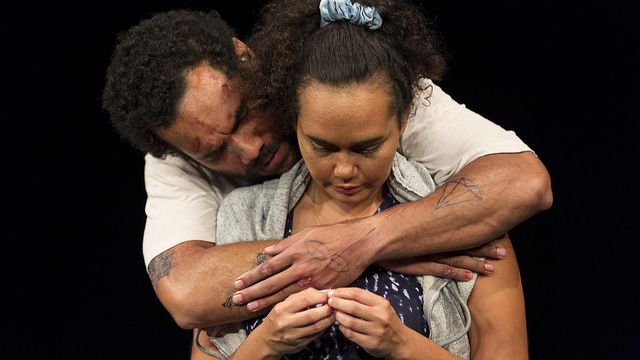Kill the Messenger
Nakkiah Lui doesn’t need an elaborate set or fancy props or intricate lighting to tell her stories. She just needs her words, a good cast – and an audience who listens … because what she has to say is important. It isn’t earth shattering, or deeply philosophical. In fact it’s what most of us know already. What most of us know shouldn’t be happening. What most of us don’t do anything to change.
And that’s what Lui’s play is all about: situations that have been reported over and over and over again – aboriginal deaths in custody, suicides, illiteracy; injustices that are ignored by government agencies, journalists, neighbours … things that wouldn’t keep happening “if we took caring for each other as a serious responsibility” (Lui).
She doesn’t preach. She doesn’t exaggerate. She tells it as it is – simply, straightforwardly, with concern, humour, realism, and some righteous anger – on a stark, dark, empty stage, illuminated by a bright rectangle of light, sometimes framed by projected scenes of a park, or family photos. The structure of the play is unusual, the themes a little black but it is the stories that are important here, and Anthea Williams’ direction is suitably tight and natural.
Set in Western Sydney, the play interweaves the stories of two families … “five individuals who collide around questions of family bonds, institutional racism and the value of life”.

Paul (Lasarus Ratuere), is a drug addict who is suffering undiagnosed pain. Harley, his sister, (Katie Beckett), agonises over his addiction, his pain and the things he steals from her to support his habit – but they are close, they care about each other, are both scared about the future. Ratuere and Beckett establish all of this very clearly and naturally, their fear and their anger offset by compassion.
Beckett portrays a different anger that simmers to boiling point later in the play in scenes with Alex, a triage nurse. Matthew Backer is movingly convincing as Alex, all the many frustrations and responsibilities of nursing spilling over in a beautifully realised role.
Lui herself plays Nakkiah, who tells a family story of institutionalised neglect that is heart breaking. Two screens are filled with images of her grandparents, her mother, herself, and a termite-ridden house as Lui’s tells her story of a family being moved the country to government housing in Western Sydney. She describes their pride in the house, the fact that they are not allowed to do any repairs themselves, the destructive effects of the termites, the year of daily pleas to the Aboriginal Housing Authority to repair the house, her grandmother’s inevitable fall through the floorboards, and the vigil at her hospital death bed.
 The words are simple, the tone conversational, the description compelling. It is a horrific story – but Lui softens it with gentle humour and snippets of family memories.
The words are simple, the tone conversational, the description compelling. It is a horrific story – but Lui softens it with gentle humour and snippets of family memories.
Her inevitable guilt she tries to clarify with Peter (Sam O’Sullivan), the boyfriend she was with when her grandmother died. Peter is caring but rational and O’Sullivan plays the sounding-board philosopher with gentle reason and good humour.
The link between the families occurs in a park not far from the hospital. Here Paul and Nakkiah meet and establish a bond based on humour and concern – and trust. These scenes aren’t long, but they are beautifully crafted and infer much more than the words exchanged.
Nakkiah Lui has a lot to say – and she takes it to the stage in the simplest possible way – through real stories, believable characters and compelling messages. “I wanted to be as honest as possible,” she writes, “ and I knew that would mean I had to start with me.”
Carol Wimmer
Photographer: Brett Boardman.
Subscribe to our E-Newsletter, buy our latest print edition or find a Performing Arts book at Book Nook.

